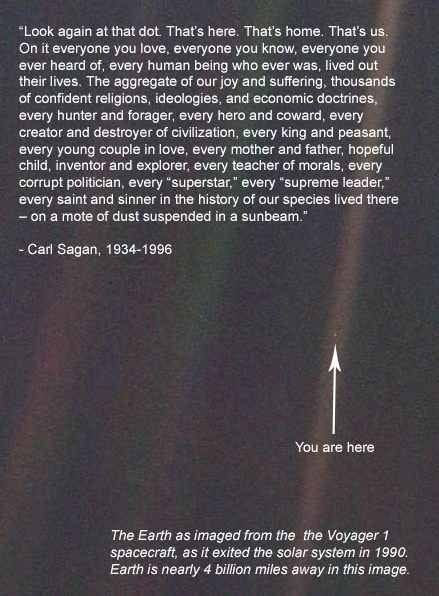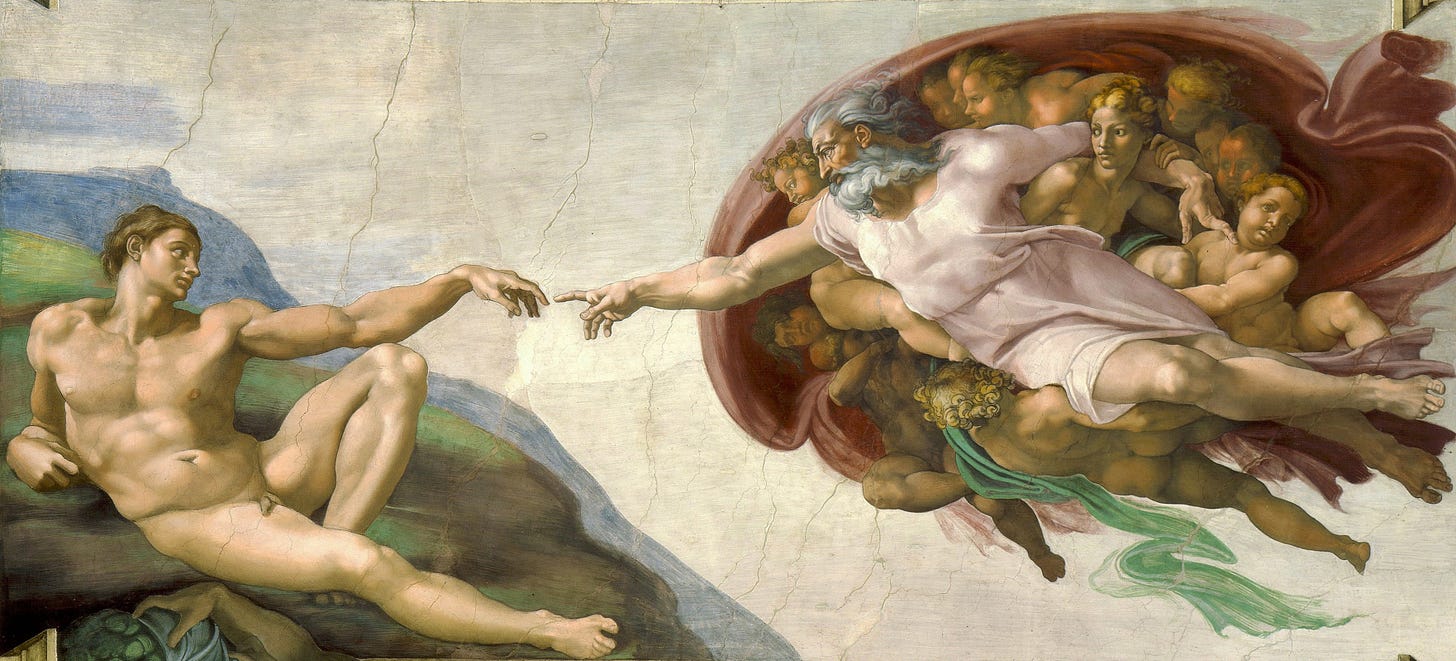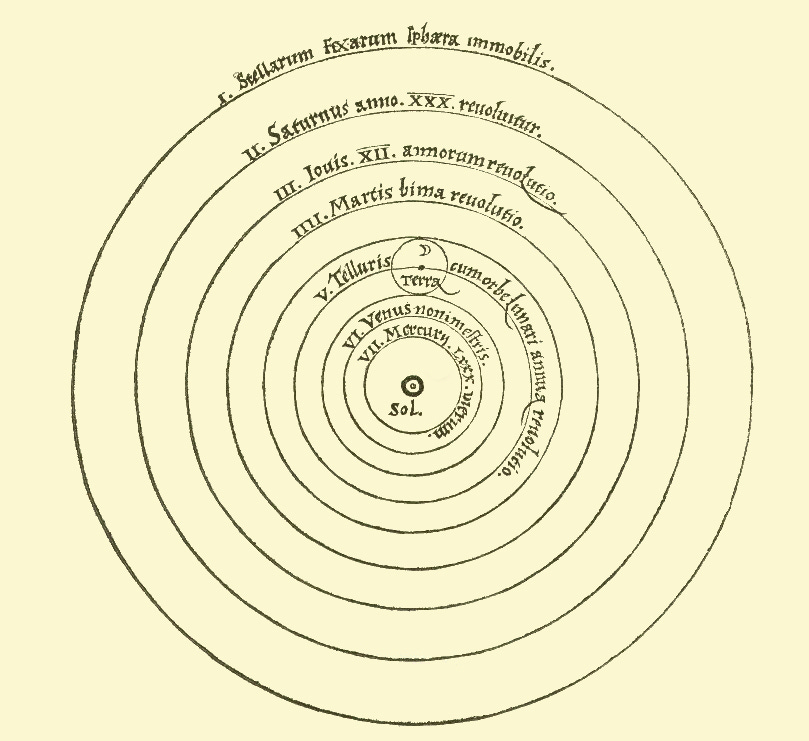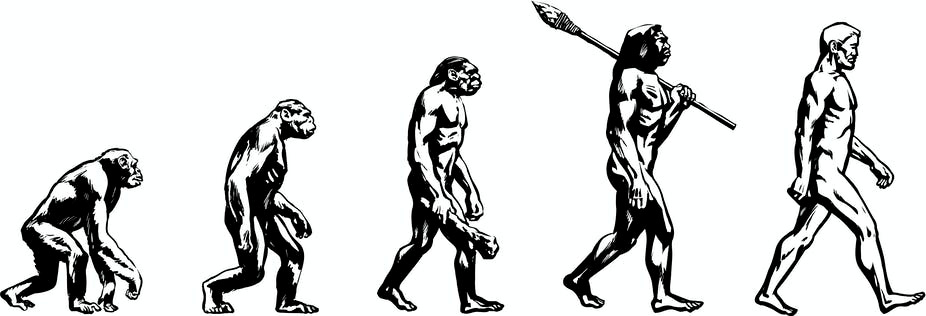This is one of the most iconic photos ever taken.
Carl Sagan was probably the greatest science communicator to have ever lived, paralleled only by the likes of Michael Faraday and Richard Feynman.
These men pushed for the greater reach of science to the public.
To make it accessible.
To make it fun.
To inspire every kid who ever looked up to the sky in awe, that he/she could one day figure out the mystery behind these things.
Sagan became forever synonymous with the “Pale Blue Dot” quote of his. It would be used by every scientist, politician, celebrity, and parent for years to come. It was the ultimate “Be humble/grounded” phrase, used by people to emphasize repeatedly of our insignificance in this infinite universe,
or if you like to think in Indian terms, it was the equivalent of “Beta, zameen par aajao” but scaled to a billion people!! 😅
Even though what Sagan said was true, it was a bit misleading.
And yes, that is possible.
Let me explain…
Consider another statement, this time by Stephen Hawking.
Humans are just a chemical scum on the surface of a typical planet, that’s in orbit round a typical star, on the outskirts of a typical galaxy
Again, this statement is just a shorter, boring, blunt version of the “Pale Blue Dot” quote.
It emphasizes the same point, of us being no more special than any other species, of us being no more lucky than anyone else, and of us being an insignificant part of this universe…
All of this, at least according to the British physicist David Deutsch, is very, very misleading.
Misleading because Deutsch argues that these statements are, in reality, paradoxical in nature. On one hand you have the farthest “man-made” object in space (Voyager 1) clicking and sending back photos from billions of miles away, and on the other hand, we are casually dismissed as mere chemical scum, floating in this giant universe, expected to be grateful for it, because “Hey! You are alive because of the wonders of the universe, so you better respect it!!”.
It’s true, we are alive because of the wonders of the universe, had the laws of physics been just a tiny bit different, we wouldn’t be here.
But David talks about the invisible force that we take for granted, a force so powerful that it has the ability to push against the universe itself, and yet it’s not a part of any physical model since we still struggle to define it.
It’s the force of knowledge.
Knowledge, at its very core, is the process of creating order, of creating patterns, of converting the gifts of nature into something meaningful, in a way that the universe on its own couldn’t have done.
Take a moment and reflect on what I just said.
…
Do you realize the philosophical implications of it? We, a chemical scum in the corner of an infinitely large universe, have the ability to create something which the universe cannot.
Are we then beating the universe in every moment of time?
!!
Let’s go deeper to try and understand what Deutsch is really trying to convey, but for that, we need some context.
First Step Towards Progress
For the longest period of time, humans could only explain the world as they saw it. They attached words and meanings to things that they could see, smell or touch. Their understanding was limited to their senses.
But then something weird happened.
We began attaching meaning to things that we weren’t able to understand, in terms of things that we ‘could’ understand or explain.
For example, when we didn’t understand as to why seasons change, or why the stars appear at night, we came up with explanations that made immediate sense to us, we placed “some human/animal” as the reason for these phenomena, we thought that “someone” is controlling this and that, and ‘that someone’ must be really powerful.
In short, we had started creating myths in order to understand what was going on. But myths and stories weren’t the only things that we created, humans also began separating the abstract from physical reality.
We created numbers, which weren’t a physical reality on their own but helped explain physical stuff, just like money has no value on its own but rather gives value to tangible (and also intangible) stuff.
It’s important to note here that what’s happening is not normal in any way, No other lifeform was creating and passing on information to its next generation like we were, and we weren’t only passing on the genetic code of life (which every living organism does), we were also passing on our perceptions of the world, the stories, the myths, the numbers. Knowledge creation had begun. It was the first step towards progress.
Fast-forward to the pre-enlightenment era.
Physics and The Principle of Mediocrity
The problems with our collective knowledge had become glaringly clear. Remember, we had created a lot of knowledge till now but most of it was still untrue, because we simply lacked any better explanation.
Our understanding of the world had become anthropocentric, i.e, human centric, and space was now geocentric, where our home was the centre of the universe.
The scientific revolution led by Copernicus, and boosted by the likes of Galileo and Kepler ended these fictions of mind.
Rigorous mathematics and experiments paved the way for a new form of understanding the world around us. A scientific revolutionary fever gripped the entire continent of Europe. Man was finally able to understand things as they were instead of perceiving it in his own ways, he could explain things in a better way, with evidence in his hands…
Then Newton happened and the world changed forever.
He single-handedly exposed the machinery of the universe, a clockwork of things, where each movement could be predicted, every natural event deterministic, and every piece in order. He established that the laws in space were the same as on earth, the rules of nature were in fact universal and encoded permanently into its fabric, life being just a small piece of this large puzzle.
These advances in science, particularly in physics and astronomy, led to a prevalent misconception among the scientific community to what Deutsch calls the “Principle of Mediocrity”, the notion that we humans are negligible in the cosmic scheme of things, and that the reality is so complex that it’s outside our abilities to ever understand it, let alone control it.
But this goes against all the evidence!
It is true that we still don’t understand everything, but that did not stop us from knowing the chemical composition of stars, or launching an object into space. It also didn’t stop us from harnessing the force of electromagnetism as a source of energy and as a means of communicating at the speed of light.
We cannot understand the quantum world, yet we did split an atom and invent the microprocessor, all of which runs on the underlying rules of that world.
The point Deutsch is trying to make is that the universe didn’t gift us with these things, it’s WE who created and built stuff. Simply having the building blocks was not enough, for that matter the universe is full of it, and it would have been just lying there had ‘WE’ not used our understanding and knowledge to transform it into something meaningful, into something that even the universe could not!
Evolution and The “Life-supporting” Earth
Another widespread thought that Deutsch deems as a misconception is this notion of the Earth being our only saviour, it being a “life-supporting system” that we would never be able to leave.
This thought comes directly from the disciples of Darwin, who are the torch-bearers of the revolutionary theory of evolution, genes and life itself.
Sadly, they are also the torch-bearers of the human insignificance, that we don’t differ much from other organisms, and that we are as vulnerable as anyone, so we better stick to our one and only home, the Earth.
This again, contradicts the evidence.
The Earth IS a rare phenomenon in this gigantic universe, a place of order, design and the miracle of life, yet for anyone who knows its history, it was more of a death trap for life than a supporting system.
More than 99% of species that ever lived on this planet are no more, simply because either the natural events of the Earth destroyed them or a higher form of life survived. A higher form of life was nothing but the gene that had replicated more than the other, helping a species in adapting to the new conditions.
But evolutionary intelligence was not enough for us to survive, resources were scarce and our environment hostile to us, so what did we do?
We made tools and built shelters to keep away from danger, we invented agriculture to have a sustainable source of food, and most importantly, we passed on these things to the next generation, who used the existing knowledge to further build newer things, things that tackled other problems, solutions that made life easier.
We made the earth more habitable for us than the other way around.
And so Deutsch argues, what stops us from leaving this planet? We already have knowledge for our survival, and if we could alter the earth to our needs, why not any other place that is also bounded just by the laws of physics?
Our knowledge, as Deutsch says, has no bounds…
The Infinite Highway of Progress
Imagine you are in your car, driving on the highway of progress.
For the longest time, Humans never felt any change. The rate of change was so slow and gradual, that to an average person, life would have seemed like a car on brake, hardly moving forward, lacking any purpose.
But things did change. We started understanding the world as it was supposed to be, and found explanations that were universal.
We passed on learnings to the future generations, so that they could appreciate the wonders of this world, of this universe.
We started driving fast. We accelerated.
But somewhere along the road, we stopped giving enough credit to ourselves, we started believing that we were too small and didn’t matter in the cosmic scheme of things.
This feeling grew as the pandemic hit and destroyed the order of life. It caused us suffering and pain, and still continues to do so. It seemed as if all the progress that we made was inconsequential in the face of a micro-organism, rampaging through the economic and social fabric of our lives, with no end in sight, with no light at the end of the tunnel…
Yet we managed to create an order in life, we adapted to a new normal and kept heading on.
Researchers and scientists created a vaccine within a time period that would have sounded like a Sci-Fi plot a year ago.
Businesses adopted new technologies that they otherwise wouldn’t have done.
Though we couldn’t go outside, the powers of the internet never let us be alone even for a moment, we were in touch with our loved ones and other people, we were hyperconnected, something that could not have been possible a decade ago.
It still isn’t over, in fact the situation is worse. Even with a solution in hand, the irrationality of few men has overwhelmed the system.
It feels like we are stuck again, in a loop that just doesn’t stop, hopeless for the future…
But hope is even more powerful than knowledge.
hope leads us to what we cannot still concieve, but what we deserve.
It makes us move forward on the highway of progress, no matter how many roadblocks we face.
Is this what David Deutsch wanted to convey? Is Covid just a roadblock, a blip on the infinite highway of progress? will we accelerate faster once we pass this block?
Is this the “Beginning of Infinity” ?
I believe it is.
What about you?
Most of what I have written is directly borrowed from David’s book “The Beginning of Infinity”.
It’s one of the most profound books ever written, and deeply philosphical in nature.
Naval Ravikant talks a lot about this book.
you can check out his thoughts on the book on his website: https://nav.al/
You can also check out these TED talks by the man himself!!
Take care, stay strong!!
Cheers!








